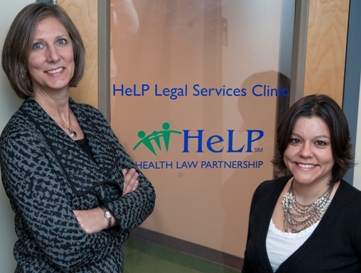College Site | Development | TOC - Department Dev Sites | CLHS TOC | Center for Law, Health & Society | News and Events | Center News | HeLP Clinic Students Win SSI Case for Needy Child HeLP Clinic Students Win SSI Case for Needy Child
February 10, 2011
While enrolled in the HeLP Legal Services Clinic in Spring 2010, two law students, Abigail Ferrell and Cara Comparetta, took over the case of an 8-year-old child who had been diagnosed with a genetic disorder and experienced functional limitations since birth. Because of her genetic disorder and other diagnoses, she had below-average cognitive skills and language skills. She received special education and other services including speech and language therapy. She also experienced physical impairments, including difficulty with balance, movement and fine motor skills, for which she required physical and occupational therapy. Her mother sought help from the HeLP Clinic to obtain Supplemental Security Income (SSI) benefits and Medicaid benefits to help support the child, who needed substantial medical and social resources to cope with her condition.
 According to Professor Lisa R. Bliss, who supervised the two students, the HeLP Clinic had taken on the case a year earlier when the mother's application for SSI benefits and first level of appeal were both denied. Previous HeLP Clinic students developed the extensive medical file and wrote a letter brief to the Social Security Administration explaining the evidence in support of the child's claim for benefits. Four years after the initial application for benefits, the case was finally coming up for a hearing, giving Ferrell and Comparetta an opportunity to appear in front of an Administrative Law Judge (ALJ) on behalf of their client.
According to Professor Lisa R. Bliss, who supervised the two students, the HeLP Clinic had taken on the case a year earlier when the mother's application for SSI benefits and first level of appeal were both denied. Previous HeLP Clinic students developed the extensive medical file and wrote a letter brief to the Social Security Administration explaining the evidence in support of the child's claim for benefits. Four years after the initial application for benefits, the case was finally coming up for a hearing, giving Ferrell and Comparetta an opportunity to appear in front of an Administrative Law Judge (ALJ) on behalf of their client.
"After waiting for so long for a hearing date, we received a fully favorable decision from an Administrative Law Judge within the Social Security Administration," said Ferrell. "While Cara and I had only been working on the case for a semester, Clinic students had been preparing for the hearing for months, living in this gray purgatory of waiting for a hearing date and wondering if all the work put in by earlier Clinic students would ultimately be successful."
As a result of the students' advocacy, the client was awarded low-income financial benefits and automatically qualified for Medicaid and four years' worth of back benefits going back to the date of filing in 2006.
Ferrell and Comparetta worked together to build the best hearing evidence possible. "We worked with the client so much over the semester that by the time we finally went to hearing, we knew that we had done everything we could to prepare," said Ferrell. "I think the familiarity between Cara, the client, and me helped the family through the testimony."
The first interview with the client and family helped the students appreciate the seriousness of their role in helping the family. "Cara and I had been pouring over the child's medical records for weeks before meeting the child and family," recalled Ferrell. "I think our first meeting with them is when the full impact of the child's developmental and genetic disabilities really hit me. It was clear that daily life was a huge struggle." Comparetta added, "It was powerful to realize the impact of representing a real client, particularly a child, and especially knowing that advocating on her behalf could change the course of her health and future."
The experience in the HeLP Clinic of managing cases and interacting with clients is invaluable for many students. "The opportunity to manage cases day-to-day, to make key decisions regarding strategy, and to ultimately prepare and argue our case in front of a judge provides a firm foundation for my legal career," said Comparetta.
"One of the greatest criticisms of America's legal education system is the lack of practical experience," reflected Bliss. In many law schools, law students who do not seek out legal experience, through clinics or externships, may graduate and pass the bar without any practical experience. "The HeLP Clinic allows students to earn course credit at the same time that they gain excellent practical experience in the legal field," Bliss said. "We offer close faculty supervision while students learn how to represent clients."